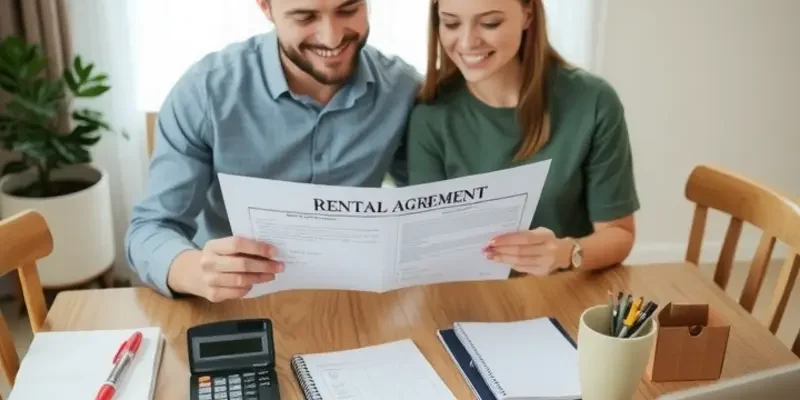Finding the perfect rental can be both thrilling and daunting, especially for students, young professionals, and families embarking on this exciting journey. Financial clarity is crucial in ensuring that your chosen home fits your budget and lifestyle. With numerous factors at play—from understanding lease agreements to budgeting essentials—this guide is designed to offer approachable tips and insights that empower renters to make informed decisions. Whether you are a first-time renter or navigating rental agreements with a partner or family, understanding the financial implications of renting is key to a successful experience. With this knowledge, you can avoid common pitfalls, plan your expenses effectively, and create a comfortable living situation that suits your needs. Let’s dive into essential strategies and insights that will guide you through the complexities of rental finance.
Understanding Your Rent Budget: The Key to Smart Renting

Setting a realistic rent budget is a crucial first step in your journey as a renter. To start, evaluate your monthly income. Whether it comes from a part-time job, student loans, or parental support, knowing this figure is essential for calculating what you can afford. A common guideline is to allocate no more than 30% of your monthly income to rent. This percentage is a general rule, yet your personal circumstances might allow for more, or necessitate less, depending on other financial commitments.
Next, take stock of your monthly expenses. List out fixed costs such as groceries, transportation, and utilities. Don’t forget to include discretionary spending on entertainment or dining out. An accurate account of these expenditures will help you determine what’s left for savings and rent.
Savings should also play a role in your budget. Whether you’re setting aside funds for unexpected emergencies or planning for upcoming tuition costs, ensuring that you have a cushion is wise. Determine a fixed amount and treat it as non-negotiable in your monthly budget. This proactive measure will protect you from financial stress down the line.
Once you have these figures, the process of calculating your maximum rent becomes clearer. Subtract your expenses and desired savings from your income to get a feasible rent range. This range should guide your apartment search, ensuring you only consider options within your financial means. Remember, apartments with extra amenities might seem attractive but could strain your budget. Distinguishing between needs and wants is key here.
Flexibility is another factor in budgeting. Your financial input from jobs or support might fluctuate, especially if you are a student working part-time. Therefore, it’s prudent to opt for rent at the lower end of your range, freeing up more cash for unforeseen expenses or savings boosts when income streams exceed expectations.
Moreover, consider location and transportation. An apartment in a central area may reduce your commuting expenses but typically comes with higher rent. Research different neighborhoods and weigh the pros and cons of each. For instance, this guide on urban versus suburban renting can provide insights into cost variations between locations.
In conclusion, crafting a rent budget requires a realistic view of your financial landscape. By carefully calculating your income, expenses, and savings goals, you pave the way for a sustainable renting experience, allowing you to enjoy your space without financial burden.
Deciphering Lease Agreements: Know What You’re Signing

Signing a lease agreement for your first rental can be daunting. However, understanding key clauses empowers you to make informed decisions and protect your interests. Start by reading the entire lease. Tend to the details, and don’t rush, as this document outlines your living conditions and financial obligations.
Rent Payment Terms: Ensure you know the precise rent amount, due date, and acceptable payment methods. Some leases impose penalties for late payments, while others offer grace periods — knowing these details can save you heartache and money.
Security Deposits: These deposits often cause confusion. Confirm the deposit amount, the conditions for its return, and any deductions the landlord can make. Also, find out if it earns interest, as local laws vary. Clear knowledge of these aspects prevents unwanted surprises when you move out.
Maintenance and Repairs: Determine who handles maintenance and repairs. Is it your responsibility or the landlord’s? Leases often specify responsibilities for issues like plumbing and electrical failures. If a clause seems ambiguous, seek clarification before signing.
Termination and Renewal Clauses: Many renters overlook these crucial elements. Know the required notice period if you plan to move out and any automatic renewal clauses. Some landlords ask for a 30- or 60-day notice, so mark your calendar to avoid penalties.
Utilities and Other Fees: Always check which utilities are included in your rent. Paying for unexpectedly uncovered utilities can strain a tight budget. Many leases also incorporate fees for amenities like parking or pet accommodation; so, be sure you understand all associated costs.
Pet Policies: If you have a pet, make sure the pet policy is clear. Some apartments charge pet fees, deposits, or even monthly rent. Check out pet-friendly apartment furniture covers to help protect your investment and make your pet feel at home.
Alteration Permissions: Many leases restrict decorating or making structural changes. Confirm what modifications you can make and any procedures for gaining approval. Often, renters can paint walls, but check if you must restore the original color before leaving.
Understanding your lease is crucial to a hassle-free renting experience. If you’re uncertain about any terms, ask the landlord for clarification or consult a legal expert. Ensuring you align with the lease agreement from the start fosters a positive and transparent renting journey.
Final words
Navigating the world of rental finance can seem overwhelming, but with the right tools and knowledge, it becomes manageable. By effectively budgeting for your rent and understanding your lease, you set the stage for a successful renting experience. Always remember to read through leasing documents thoroughly, and don’t hesitate to ask questions or seek assistance when necessary. Your home should be a source of comfort and stability, and equipping yourself with financial savvy ensures just that. Make informed choices and enjoy the journey of finding your perfect rental!









